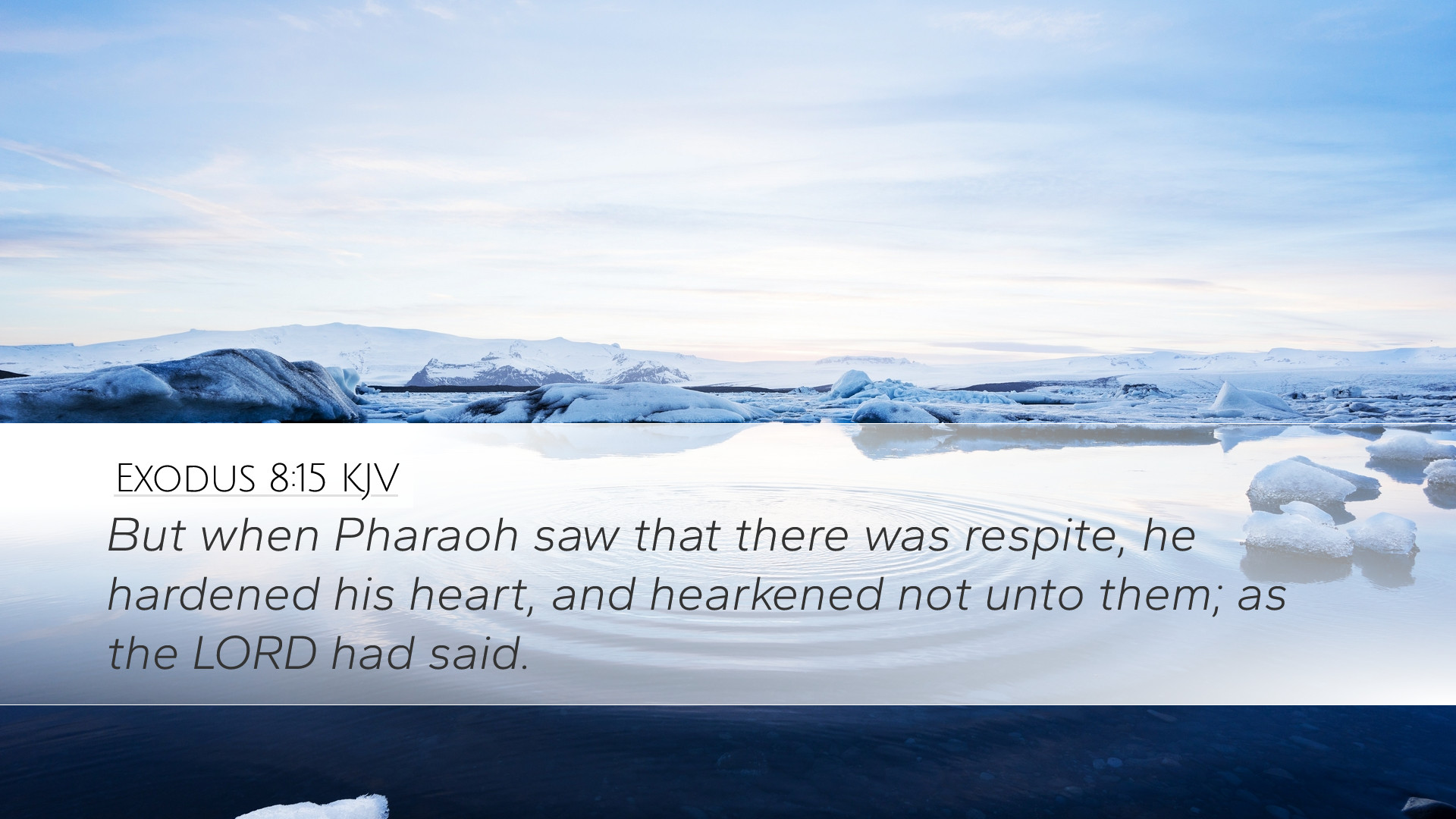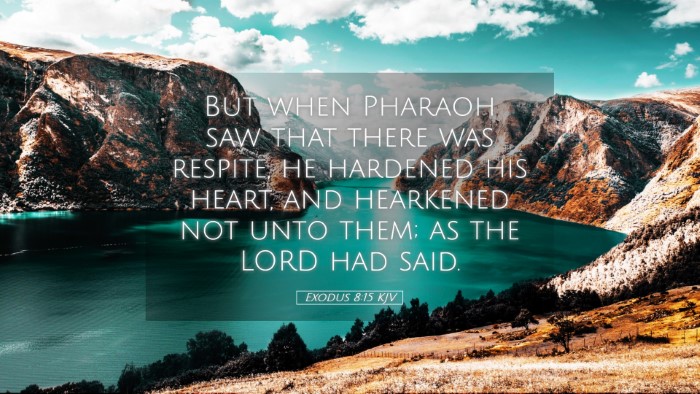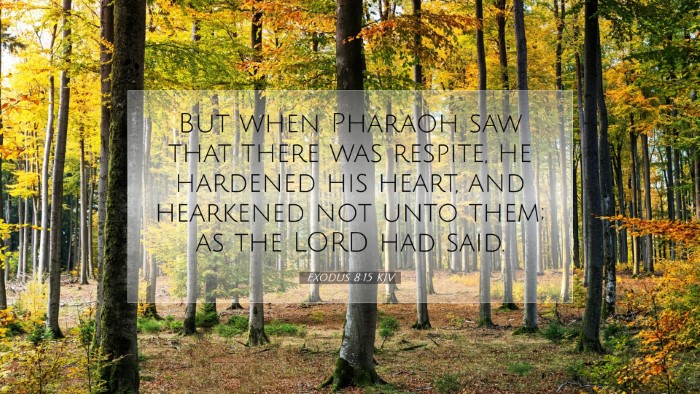Commentary on Exodus 8:15
Verse: "But when Pharaoh saw that there was respite, he hardened his heart, and hearkened not unto them; as the LORD had said."
Introduction
The passage of Exodus 8:15 presents a pivotal moment in the narrative of the Exodus, illustrating the deep-seated resistance of Pharaoh against divine authority. In this verse, we observe the stubbornness of a heart unwilling to heed God's commandments, despite witnessing His power through the plagues. This commentary will synthesize insights from public domain commentaries by Matthew Henry, Albert Barnes, and Adam Clarke, focusing on the implications for leadership, the nature of repentance, and the sovereignty of God.
Contextual Background
The plagues serve as a divine demonstration of God's authority over Egypt and its gods. Chapter 8 describes the second cycle of plagues, following the first plague of blood and the second plague of frogs. The verses leading up to 15 show the effects of these plagues on Pharaoh and the Egyptian people, creating an atmosphere of desperation. Pharaoh's initial response is one of plea for relief, promising to let the Israelites go if God would remove the frogs. However, once relief is granted, he retracts his promise, illustrating a key theme of hardening hearts.
Pharaoh's Hardened Heart
-
Matthew Henry's Insight: Henry emphasizes the spiritual blindness and obstinacy of Pharaoh’s heart. He notes that the 'respite' offered by God should have acted as an opportunity for Pharaoh to repent, yet he chose instead to harden himself. This is a reflection of human nature, and it serves as a warning to those who might presume upon divine mercy without genuine repentance.
-
Albert Barnes' Commentary: Barnes points out that Pharaoh’s heart was not simply hardened by external forces but was a consequence of his own choices. His initial willingness to negotiate was compromised by pride and a recovery of power, leading him to dismiss God's authority. Barnes argues that this passage illustrates the danger of receiving God’s mercy without transformation, warning against a superficial seeking of divine assistance that results in unaltered hearts.
-
Adam Clarke's Analysis: Clarke provides a detailed theological insight into the theological implications of a hardened heart as it relates to divine sovereignty. He discusses the tension between God's will and human agency, suggesting that while God’s actions are sovereign, humans remain accountable for their choices. He emphasizes that Pharaoh's hardening is a backdrop against which God's glory is revealed and is ultimately a demonstration of divine justice.
The Nature of Repentance
Pharaoh's response raises questions about the nature of true repentance. While he appears to seek relief, it is temporary and conditioned by self-interest rather than a sincere change of heart. This brings forth the following insights:
-
Henry's Reflection: True repentance involves a recognition of sin and a sincere desire to return to God. Pharaoh’s pattern exposes a superficial acknowledgment of wrongdoing, highlighting the necessity of true contrition and transformation.
-
Barnes on Spiritual Response: Barnes highlights the perpetual cycle of sin leading to temporary distress and subsequent hardening. The commentary challenges readers to reflect on their responses to divine correction—whether they seek to genuinely change or merely seek comfort during crisis.
-
Clarke's Toil in Solidarity: Clarke notes that the hardness of Pharaoh's heart illustrates the peril of resisting the Spirit of God. The dangers of failing to embrace the full counsel of God leads one further away from the truth, leading to an even more hardened state that rejects redemption.
The Sovereignty of God
The narrative underscores the ultimate sovereignty of God over human affairs. Pharaoh's obstinacy serves to highlight the various means through which God’s will is accomplished.
-
Matthew Henry's Theological Focus: Henry remarks that God may allow individuals to harden their hearts in order to display His glory through acts of judgment and mercy. Pharaoh becomes a vessel for demonstrating God’s power, reminding us that even amid rebellion, God's plans will come to fruition.
-
Barnes on Spiritual Outcomes: The commentary illustrates that divine actions are ultimately designed to lead to repentance and recognition of His sovereignty. Each plague heightens this perspective, pressing Pharaoh towards acknowledgment of the Lord’s supremacy, though he ultimately chooses blindness.
-
Clarke’s Divine Justification: Clarke articulates that God's sovereignty does not nullify Pharaoh’s responsibility. The interplay of divine will and human choice serves as a reminder of how divine justice unfolds, encouraging believers to seek faithfulness amidst trials.
Conclusion
Exodus 8:15 presents a multifaceted examination of heart condition under the scrutiny of divine intervention. Insights drawn from various public domain commentaries illuminate essential lessons for pastors, theologians, and believers. The themes of hardening hearts, the nature of genuine repentance, and the unwavering sovereignty of God serve as poignant reminders of the spiritual realities we face today. As we engage with this text, we are encouraged to examine our own responses to God’s authority and remain vigilant against the temptations to harden our own hearts.


